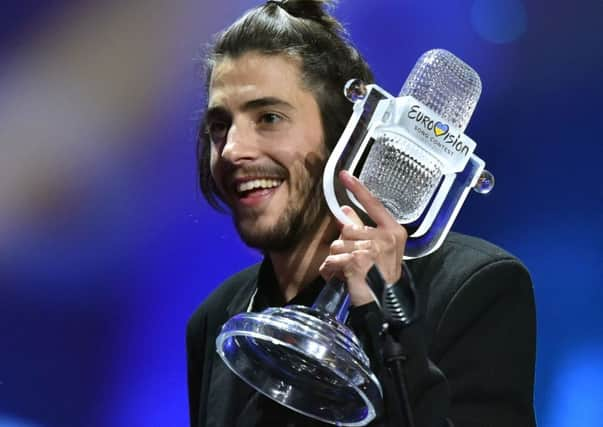Review: Eurovision Song Contest


For a while, a month or two ago, it was looking doubtful that Ukraine would even host the contest, such was their lack of preparation. Not content with angering the contest organisers, the EBU (European Broadcasting Union), over their laissez-faire attitude towards the organisation of what is the world’s biggest and most complex TV show, Ukraine then very publicly banned the girl who had been selected to sing for Russia because she had recently performed in Crimea, a disputed territory which once formed part of Ukraine but is currently under Russian administration. Russia took umbrage that the Ukrainians were flying in the face of their “Celebrate Diversity” theme for this year by banning their singer – who uses a wheelchair – and a war of words ensued, culminating in the withdrawal of Russia from this year’s show before rehearsals even started.
Heavy stuff for a show which is generally considered to be a light and fluffy camp-fest.
Advertisement
Hide AdAdvertisement
Hide AdBut in the end, the Ukrainians staged what turned out to be a hugely entertaining and colourful spectacle in Kiev’s International Exhibition Centre. The theme, as mentioned, was Celebrate Diversity, and what better way to show the diversity of a nation than to have the event hosted by three white males... OK, so maybe their idea of diversity is a little different to ours.
Our three musketeers of camp, Oleksandr, Volodymyr and Timur, enthused animatedly in strange mid-Atlantic accents and generally tried to whip up the 7,000-strong audience into a frenzy of excitement and anticipation. Not that the audience needed much in the way of whipping – Eurovision fans are among the most excitable and genuinely passionate followers of their favourite event on the planet. Let’s face it, you’ve got to be seriously into it if you are an 18-stone bear with full beard who attends the show dressed as a Russian grannies in full folk garb. This year’s crowd also included a number of grown men in gorilla suits – there to support Italy’s entry.
Over the years, Eurovision has evolved from a contest for simple, jolly little pop songs, happily delivered on a small stage by fresh-faced boy/girl groups with a couple of pots of geraniums on a podium behind them, into what is now a competition to see who can produce the biggest, gaudiest and most outré act of the night on the gigantic hi-tech stage.
Saturday’s final saw no shortage of acts trying to outdo one another on that score. Take the Romanian girl/boy duo, for example, who sang a rap song interspersed with frenetic yodelling. Or there was the severe-looking lady from Azerbaijan who sang in a box with walls covered in chalk writing while a man wearing a horse’s head stood on a ladder next to her. An undoubted highlight was the rotund Croatian gentleman who sang a duet with himself in the styles of Michael Jackson and Pavarotti.
Despite Brexit the UK’s Lucie Jones managed a creditable 15th (our best placing in eight years) with a brilliant rendition of her power ballad Never Give Up On You. However, all eyes were focused on the two main favourites expected to battle it out for ultimate Eurovision glory. In one corner was Italy’s Francesco Gabbani (complete with dancing gorilla), singing a spectacular and joyful celebration of the West’s obsession with material possessions and a disposable way of life – the gorilla represented Desmond Morris’s Naked Ape from his book about human evolution and where that could lead us.
In the other corner, we had a modestly staged, hauntingly beautiful love song evocative of the 1950s sung by Portugal’s Salvador Sobral. In one of the most heart-wrenchingly touching performances seen on a Eurovision stage since Nicole sang about A Little Peace back in the early 1980s there was nary a dry eye in the house.
In the end, despite a creditable fight from Bulgaria’s Bieber-clone, Kristian Kostoff, it was the shy hipster from Lisbon who took the crown for Portugal with a record-breaking score of 758 points. His song, Love Enough For Two, touched the hearts of the continent as both the professional juries and televoters concurred that #salvadorable deserved the victory.